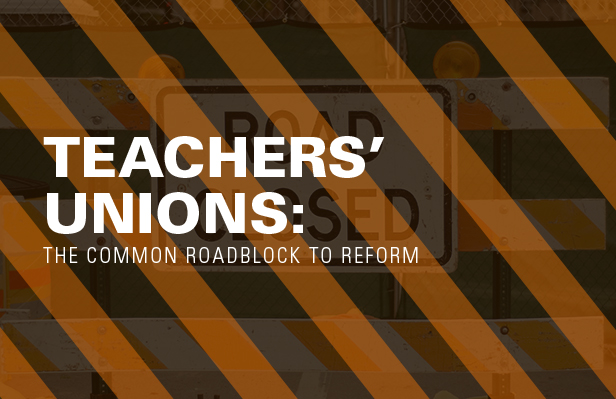Commentary

Teachers’ Unions: The Common Roadblock to Reform
Note: This commentary was published in the Bucks County Courier Times and the York Daily Record.
From Philadelphia to York to the Pittsburgh suburbs, parents and taxpayers are looking to improve public education without breaking the bank. But there’s a common roadblock standing in their way: Teachers’ unions are consigning students to some of the worst-performing schools in the state—all to retain their iron grip on power.
Nowhere is this dynamic more apparent than in Philadelphia, the state’s largest school district. There, the Philadelphia Federation of Teachers (PFT) protested in the streets after the School Reform Commission (SRC)—the state appointed body that governs city schools—decided teachers should contribute to their own health care benefits. For nearly two years, the SRC has negotiated with the PFT to reach a fair labor contract, but union leadership refused to budge.
Philadelphia teachers are being asked to pay 5 to 13 percent of their health insurance premiums, far less than the 23 percent paid by the average Pennsylvanian fortunate enough to receive employer-sponsored insurance. In response to the SRC’s modest action, PFT president Jerry Jordan imprudently declared that teachers “are not indentured servants.”
Mayor Nutter, former Gov. Rendell, and the Philadelphia Inquirer editorial board approved of the SRC’s decision as a means to infuse new dollars into city schools. Yet union leaders filed a legal challenge against the SRC and, in essence, denied Philadelphia classrooms millions of dollars in additional funds.
In York city—the second lowest performing school district in the state in 2013—the teachers’ union has rejected a litany of proposals designed to improve upon the failing status quo. Due to York’s severe cash-flow problems, the Pennsylvania Department of Education appointed David Meckley chief recovery officer and tasked him with overseeing a package of school reforms.
That was two years ago, and Meckley has been met with unwavering union obstructionism ever since.
Meckley first suggested a series of internal improvements that relied on the York City Education Association (YCEA) agreeing to concessions in a new collective-bargaining deal. The union quickly rejected a contract proposal, prompting the school board to solicit applications from charter operators interested in running York city’s schools.
Although Meckley preferred a complete conversion of all district schools into charters, he floated an intriguing compromise in which a charter operator would compete alongside district-run schools. The teachers’ union, ever averse to competition, circulated a petition to oppose charter conversion.
The YCEA’s organizing has been effective. The school board voted against the compromise proposal and tabled a vote on complete conversion even as performance measures are deteriorating. Department of Education results show that most York schools saw declining performance in 2013-14. Yet union leaders remain adamant that failing schools are good enough for York students.
The clash between student and union interests also came to a head in East Allegheny School District, where teachers went on strike for 16 days after another collective-bargaining stalemate over salaries and health benefits. Once again, it was the children and parents who suffered collateral damage of more than three weeks without classes.
While classes have resumed, the school board and the East Allegheny Education Association are currently deadlocked over salary schedules and step raises.
To be clear, teachers themselves are not to blame. It is union leadership that is failing local school systems and, quite frankly, failing the teachers they claim to represent. Teachers are not treated fairly when they are forced to fork over hundreds in annual dues which are then used to bankroll partisan politics instead of improving the classroom environment.
Take the recent charge filed by Mary Trometter, a Williamsport PSEA member, whose union dues—and even her name—were used for a partisan political mailer just before the recent election.
Philadelphia, York city, and East Allegheny each have unique challenges and circumstances, yet there is one constant actor in all three districts: recalcitrant teachers’ union leaders standing in the way of necessary reforms.
In too many cases, school boards and union executives are locked in stalemate over money and power rather than attempting to cooperatively improve the quality of education. This must change if we are to see much-needed improvement in academic performance statewide.
# # #
James Paul is a senior policy analyst for the Commonwealth Foundation (CommonwealthFoundation.org), Pennsylvania’s free market think tank.